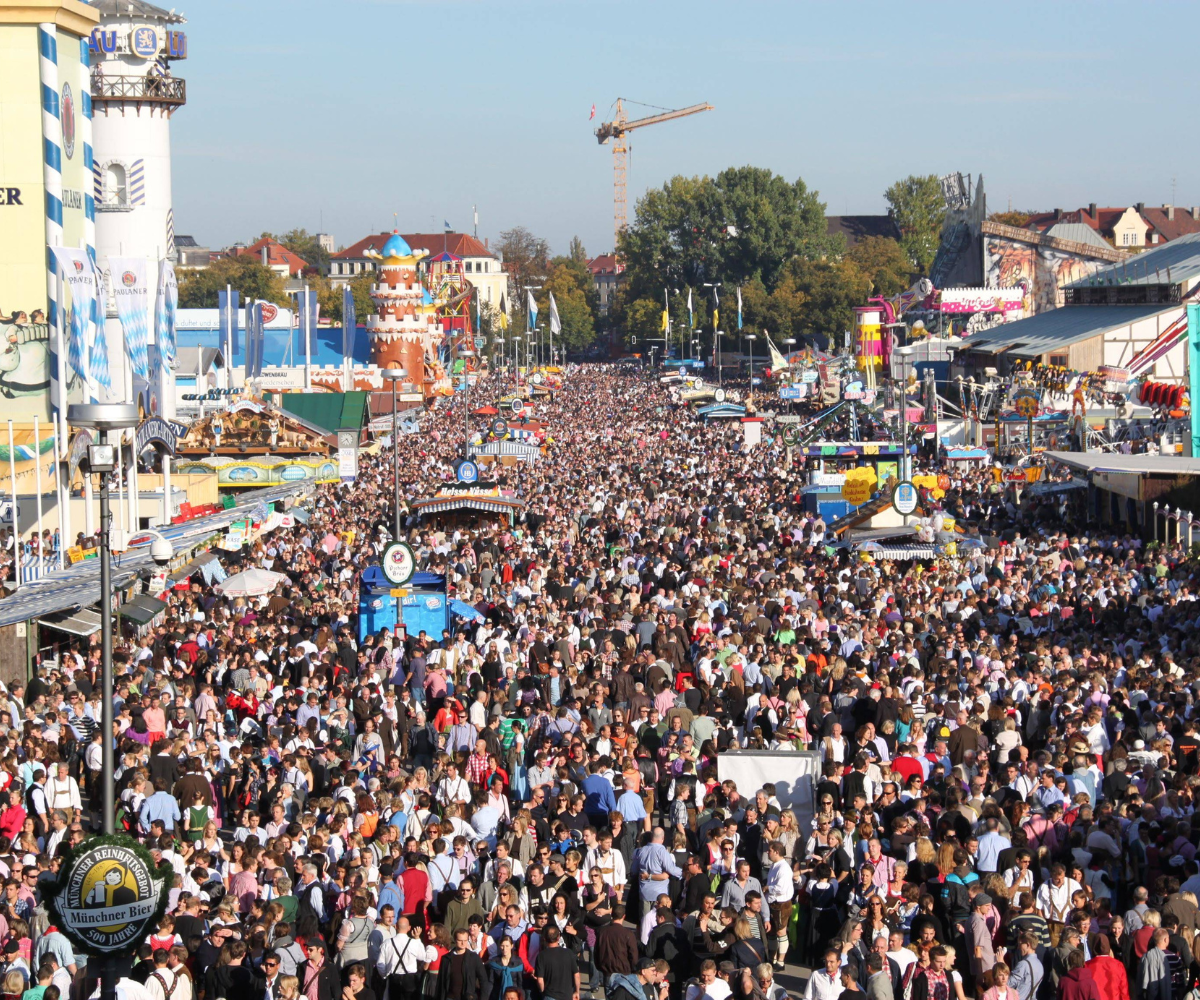Munich’s Oktoberfest: The World’s Largest Folk Festival

The Munich Oktoberfest, a festival known worldwide, has a rich history that dates back to October 12th, 1810. It all began with the royal wedding of Crown Prince Ludwig I (later King Ludwig I), the grandfather of the famous Ludwig II, to Therese Charlotte Luise of Saxony-Hildburghausen, fondly known as Therese. The grand celebration took place on the very grounds where the Oktoberfest is still held today, a place aptly named the Theresienwiese, or “Therese’s Meadow.”

Back in 1810, a horse race was organized as an attraction for the wedding festivities. The event was so popular that it was decided to repeat it the following year on the couple’s anniversary. Thus began a tradition that has grown year after year, eventually evolving into the incredible spectacle we know today. Over time, more booths, pavilions, and eventually the iconic tents were added, with the largest tents now seating between 6,000 to 7,000 people—some even accommodating up to 10,000 with outdoor seating. In total, there are 11 large tents and over 20 smaller ones, with a combined seating capacity exceeding 100,000!
It’s worth noting that reservations are not possible after 4:00 p.m., but they’re generally unnecessary unless you’re part of a group that wants to sit together. Even when the tents are full, with over 6,000 people inside, there are always some folks getting up and leaving, so finding a seat usually isn’t too difficult—except, of course, on weekend evenings when you might have to wait in line to get into a full tent.
Oktoberfest Today

Today, the Munich Oktoberfest is the largest folk festival in the world, drawing nearly six million visitors each year. However, its humble origins make the current grandeur even more remarkable, especially considering the tremendous growth in the past 50 years. These days, the amount of beer consumed is fifty times what it was 100 years ago—over six million liters!
As you can imagine, Oktoberfest is a significant economic boost for Munich and a lively time for the entire city. Most locals own traditional Bavarian clothing, known as Trachten—Lederhosen for men and Dirndls for women—and many wear these outfits only during Oktoberfest. The festival, affectionately referred to as “die Wies’n” by the locals, has seen a resurgence in the popularity of Trachten over the past 20 years. Nowadays, almost no Munich citizen would attend Oktoberfest without wearing Trachten. Even tourists have embraced this tradition, often purchasing Trachten when they arrive or even ordering them online before their trip to fully immerse themselves in the festive atmosphere.
When is the Oktoberfest in Germany?
This years Oktoberfest 2024 will start on the 21st of September and conclude on October 6th. However, every year is different.
The Oktoberfest always concludes on the first weekend of October and lasts for three weekends, starting on the third Saturday before the first Sunday of October. The festivities kick off with a formal procession to the Oktoberfest grounds on that Saturday morning in mid-to-late September. The Mayor of Munich taps the first keg at 11:00 a.m., serving the first beer to the Governor of Bavaria, followed by a traditional 12-gun salute that officially signals the start of the festival and the free flow of beer!
The real spectacle, however, is the parade that takes place on the Sunday morning following opening day, starting at 9:00 a.m. Known as the Trachten- und Schützenzug, this parade is a celebration of Trachten and tradition. Groups from all over Bavaria, as well as from Austria, Switzerland, Hungary, Romania, Ukraine, and Poland, proudly display their unique traditional clothing as they march through Munich’s streets towards the Oktoberfest grounds. This parade is truly a sight to behold, and it’s a highlight of the festival. If you’re curious, there are numerous videos on YouTube that can give you a good impression of what this parade is like—just search for “Trachten- und Schützenzug.”
Given the vast amount of beer consumed, it’s impressive how low the crime rate is at Oktoberfest. Of course, when young, drunk individuals get a bit too rowdy, the security guards are quick to step in, defusing situations as swiftly as a group of rabbits fleeing from a dog. These professionals are on top of every situation within seconds, ensuring a safe environment for everyone.
In addition to the beer and the parades, Oktoberfest offers state-of-the-art rides that, despite being non-permanent and assembled annually, provide thrilling and fun experiences. Imagine being slightly tipsy and going on one of these rides—those three minutes can feel like an eternity!
Fun Facts About Munich Oktoberfest

Here are some fun facts that you may not know about the Oktoberfest. You can learn more about it if you join one of tours!
Munich’s Oktoberfest 2024 Important Information Recap

- When does Oktoberfest start and end? Oktoberfest begins on the third Saturday before the first Sunday of October and lasts for three weekends, wrapping up on the first weekend in October.
- Do I need to make a reservation to get a seat in one of the tents? Reservations are not necessary after 4:00 p.m., and generally, you can find a seat even when the tents are full. However, on weekend evenings, you might need to wait in line to get into a tent, especially if you’re with a group that wants to sit together.
- What should I wear to Oktoberfest? Most locals and even many tourists wear traditional Bavarian clothing known as Trachten—Lederhosen for men and Dirndls for women. While it’s not mandatory, wearing Trachten adds to the festive atmosphere and helps you fit right in!
- How much beer is consumed during Oktoberfest? An astonishing six million liters of beer are consumed at Oktoberfest each year! That’s fifty times more than what was consumed 100 years ago.
- Is Oktoberfest family-friendly? Absolutely! In addition to beer, Oktoberfest offers a variety of rides, parades, and attractions that are enjoyable for visitors of all ages. The event is well-policed, ensuring a safe environment for everyone. If you want to get to know the city during the Oktoberfest we recommend you sign up to one of our bike tours.
